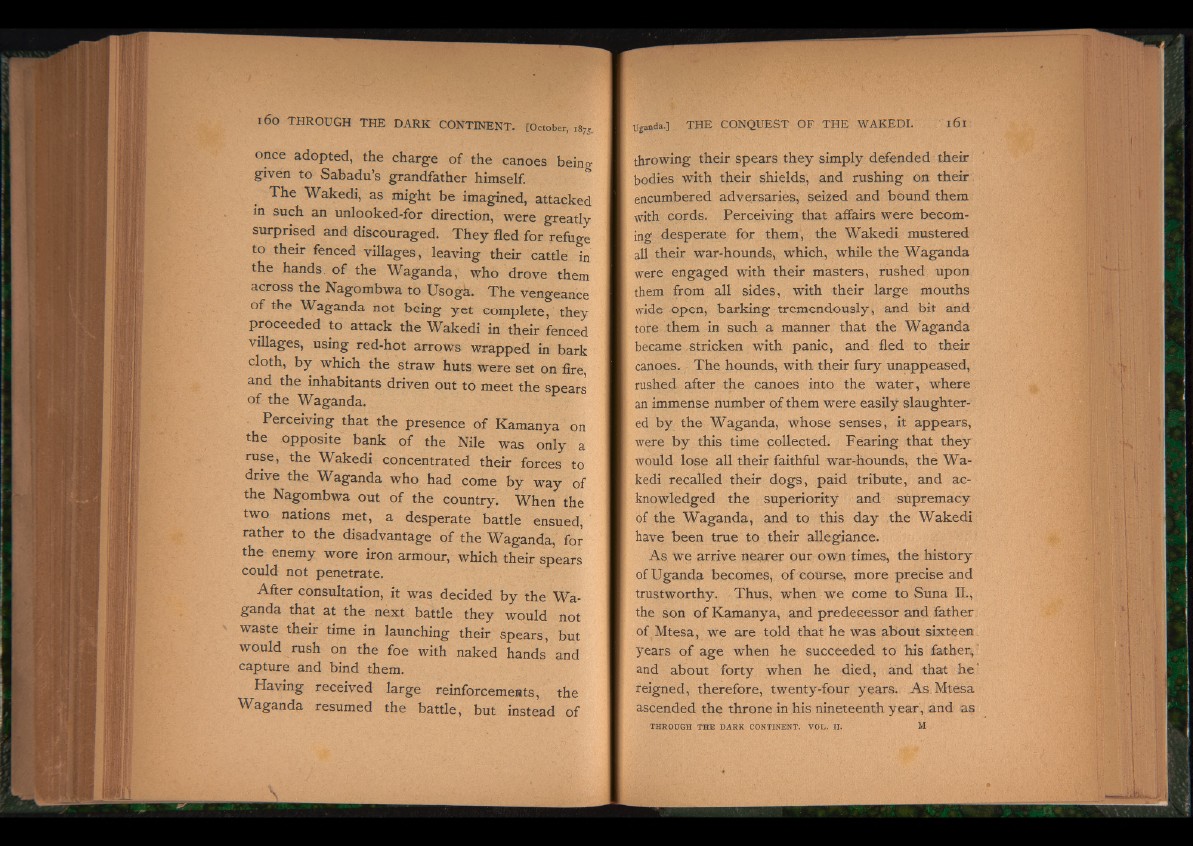
once adopted, the charge o f the canoes beino-
given to Sabadu’s grandfather himself.
T he Wakedi, as might be imagined, attacked
in such an unlooked-for direction, were greatly
surprised and discouraged. T h e y fled for refuge
to their fenced villages, leaving their cattle in
the hands o f the Waganda, who drove them
across the Nagombwa to Usoga. The vengeance
o f the Waganda not being y e t complete, they
proceeded to attack the Wakedi in their fenced
villages, using red-hot arrows wrapped in bark
cloth, b y which the straw huts were set on fire,
and the inhabitants driven out to meet the spears
o f the Waganda.
Perceiving that the presence o f Kamanya on
the opposite bank o f the Nile was only a
ruse, the Wakedi concentrated their forces to
drive the Waganda who had come b y w a y of
the Nagombwa out o f the country. When the
two nations met, a desperate battle ensued,
rather to the disadvantage o f the Waganda, for
the enemy wore iron armour, which their spears
could not penetrate.
After consultation, it was decided b y the Wa ganda
that at the next battle they would not
waste their time in launching their spears, but
would rush on the foe with naked hands and
capture and bind them.
Having received large reinforcemeats, the
Waganda resumed the battle, but instead o f
throwing their spears they simply defended their
bodies with their shields, and rushing on their
encumbered adversaries, seized and bound them
with cords. Perceiving that affairs were becoming
desperate for them, the Wakedi mustered
all their war-hounds, which, while the Waganda
were engaged with their masters, rushed upon
them from all sides, with their large mouths
wide open, barking tremendously, and bit and
tore them in such a manner that the Waganda
became stricken with panic, and fled to their
canoes. The hounds, with their fury unappeased,
rushed after the canoes into the water, where
an immense number o f them were easily slaughtered
b y the Waganda, whose senses, it appears,
were b y this time collected. Fearing that they
would lose all their faithful war-hounds, the W a kedi
recalled their d og s, paid tribute, and acknowledged
the superiority and supremacy
of the Waganda, and to this day the Wakedi
have been true to their allegiance.
A s we arrive nearer our own times, the history
of Uganda becomes, o f course, more precise and
trustworthy. Thus, when we come to Suna II.,
the son o f Kamanya, and predecessor and father
of Mtesa, we are told that he was about sixteen
years o f age when he succeeded to his father,
and about forty when he died, and that he
feigned, therefore, twenty-four years. A s Mtesa
ascended the throne in his nineteenth y ear, and as
THROUGH THE DARK CONTINENT. VOL. II. M